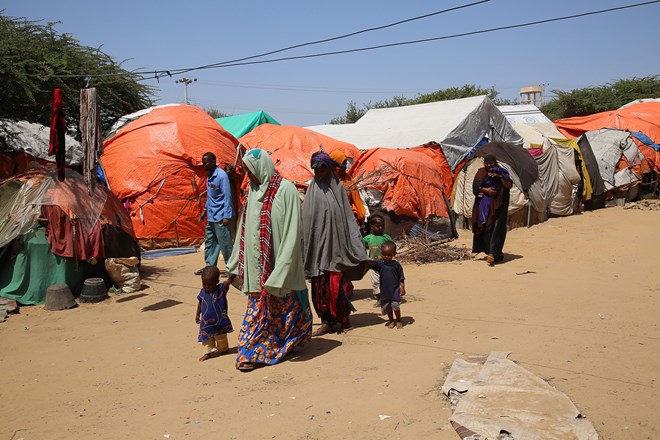Northeastern
Saturday August 14, 2021
By Hillary Chabot

Migrants in the slums of the capital Mogadishu are seen trying to survive in makeshift tents in Mogadishu, Somali. Photo by Sadak Mohamed/Anadolu Agency via Getty Images
Refugees who experience violence in the North American cities where they’ve sought asylum suffer from devastating, long-lasting mental health issues—and those issues can impact them just as deeply as the violence they faced in their home country, says Carmel Salhi, assistant professor of health sciences.
In a new study, Salhi and his colleagues examined Somali refugees’ exposure to violence in their new communities, finding that their exposure to violent experiences was both persistent and prevalent in the very places they sought safety. This so-called “post-resettlement violence” had a larger association with mental health issues than their original exposure, Salhi says.
Salhi studied feedback from 383 Somali refugees now living in cities such as Boston and Minneapolis. The study is part of a multi-year, combined effort by Northeastern’s Institute for Health Equity and Social Justice Research and the Refugee Trauma and Children’s Center at the Boston Children’s Hospital designed to research disparities in healthcare for refugee populations.
How did you decide on this line of research?
One thing that struck me while I was working with refugees is that it’s a population that’s highly exposed to violence, and yet the impact of violence after resettlement is something that is pretty under-studied.
Were you surprised at the amount of violence these refugees experienced in the places they sought asylum?
Based on my work with other refugees, I knew they would likely experience some violence, but I didn’t realize it would be more than half of the people we spoke to for this study. The other major shock was how much more it mattered than war exposure. No violence is good, but I didn’t expect that what the refugees experienced in North America would be as bad as what they were fleeing from.
What kind of violence do these refugees encounter?
Well, before they resettled the most common sort of violence is that they are forced out of their home. Like, physically forced. Some have been beaten or severely injured or they may have witnessed a loved one go through that. The refugees living in the U.S. reported incidents where they were beaten or robbed at gunpoint. So you can imagine the impact of that on a population that experienced this kind of thing before coming to the West.
Where are they experiencing these incidents?
They occur in or around people’s homes or in their neighborhoods. And what we know from the qualitative work is that they experience a lot of discrimination in complex ways, because they are refugees, they’re Black, and they are Muslim. So they were experiencing discrimination across a really wide spectrum of categories.
How can the communities where refugees resettle address these issues?
I think there needs to be more investment in communities that take on refugee populations, both in the systems that support refugees specifically but also in the communities themselves, because ultimately the goal is that the refugees become invested parts of the community. Also, this is really something that mental health providers need to be more attuned to, because I think in general the focus is on what sort of trauma these refugees experience before they came to the U.S. We need to pay attention to the challenges they experience after they have resettled.